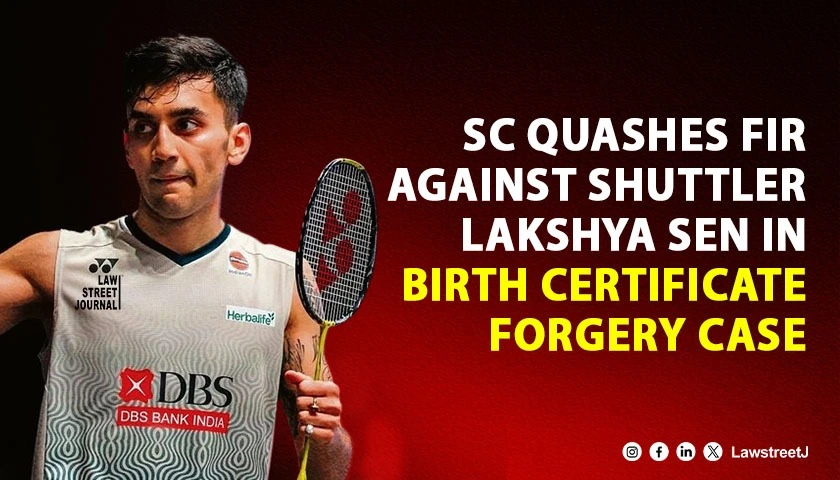NEW DELHI: The Supreme Court has quashed an FIR as well as criminal proceedings initiated against Shuttler Lakshya Sen, his brother Chirag Sen, and a coach for allegedly forging birth certificate of the sportsperson on the basis of GPF form filled by the father of the international sportsperson.
A bench of Justices Sudhanshu Dhulia and Aravind Kumar held that the continuation of the criminal proceedings against the appellants was wholly unwarranted, while allowing their appeal against the Karnataka High Court's February 19, 2025.
The High Court declined their plea to quash the FIR lodged on December 1, 2022 with High Grounds Police Station in Bengaluru on a direction by the court on a private complaint.
The complainant, Nagaraja M G referred to 1996 GPF form filled by Lakshya's father in support of his allegations of cheating and forgery.
He said investigation may be carried out would unearth the truth.
After examining the matter, the court found an evident pattern of vindictiveness that permeated the complaint filed by the man only after his daughter was denied admission to the academy in 2020.
Besides lack of merit, the court pointed out appellants, particularly Chirag and Lakshya, are sportspersons of national standing, having represented India in international badminton tournaments and having earned multiple accolades, including medals at the Commonwealth Games and BWF international events.
"To compel such individuals who have maintained an unblemished record and brought distinction to the country through sustained excellence to undergo the ordeal of a criminal trial in the absence of prima facie material would not subserve the ends of justice. The invocation of criminal law in such circumstances would amount to an abuse of process, which this court cannot countenance," the bench said.
The court said the FIR was registered even though the same matter was already examined and closed by multiple authorities, including the Sports Authority of India and the CVC, a premier integrity institution under the Government of India.
Also Read: SC stays criminal probe against ace Shuttler Lakshya Sen for alleged forging of birth certificate
"The delay, absence of new material, and apparent personal grudge collectively undermine the bona fides of the complaint," the bench said.
The court pointed out the record indicated that the very allegations now sought to be revived were earlier subjected to scrutiny by competent authorities, including Sports Authority of India and CVC, which found no material to proceed further.
"No fresh evidence has since come to light that would justify reopening what had already been closed upon due enquiry," it said.
The bench underscored, this court has repeatedly cautioned against permitting the criminal law to be used as a weapon of harassment.
"The present case is illustrative of how criminal process may be misused to achieve a collateral objective under the guise of legality," the bench said.
Senior advocate C A Sundaram and advocate Rohini Musa for the appellants contended that the complaint was a textbook instance of abuse of process, instigated by personal hostility and designed to harass them for reasons wholly extraneous to law.
They said the FIR was predicated upon an unverified and unauthenticated GPF form, which not only fails the test of admissibility but also has never been subjected to any forensic scrutiny.
Agreeing to their contention, the court opined, the case fell squarely within the category of exceptional circumstances warranting interference at the threshold to prevent abuse of the criminal process.
The court said the 1996 GPF nomination form is not only bereft of authentication, but also fails to establish any fraudulent intent or act attributable to the appellants.
"The said form, even if assumed to be genuine, does not override the birth certificates issued by statutory authorities, nor does it constitute proof of any falsification on the part of appellants," the bench said.
It held the allegations are based on conjecture and surmises, and are manifestly intended to malign the appellants.
"No dishonest inducement or gain is demonstrated, nor is there any wrongful loss caused to the State or a third party. The allegations against the appellants do not fulfil the essential ingredients of Sections 420, 468 or 471 IPC," the bench said.















